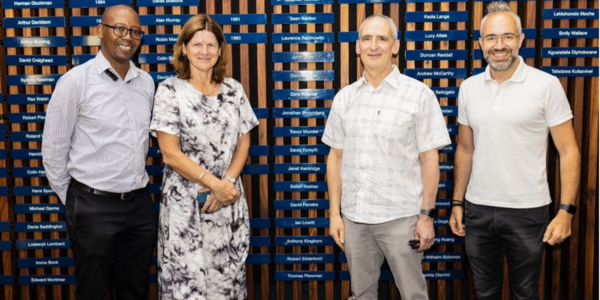African Optimist
- Wits University
It is fortunate that Sir John Lazar, a Wits Computer Science graduate, Rhodes Scholar and Fellow and President of the Royal Academy of Engineering, and who was recently conferred with a Knighthood in the King’s 2025 New Year Honours, was born at a time when computer technology was becoming mainstream.
When he was around ten years old, he was part of a group of students selected for a holiday course on which he learned computer programming with punch cards and a mainframe computer. He took to it “like a duck to water”.
His interest in computers was eagerly fostered by his father, Dr Stan Lazar, who was a radiologist and a pioneer of the use of new medical technology in South Africa who bought the young John one of the first Sinclair programmable computers.
“By the time I was ready for university, I was sure that I wanted to study computer science. At the time (the late 1970s) the Wits computer science department was very strong, as it still is today,” he says.
Lazar recalls that he also had the privilege of being tutored by the brilliant late Wits Professor Emeritus of Software Engineering, Barry Dwolatzky, who at the time was a PhD student.
In 1983 Lazar earned a Rhodes Scholarship to study at Balliol College Oxford for an MSc in Computation which he followed with a DPhil in History and Politics.
After his studies, his first position in 1987 was with Metaswitch Networks as a software engineer. Decades later in 2009 he became its CEO and in 2015, its chairman, stepping down in 2016.
Sir John served for almost eight years as a mentor and a judge for the Academy’s Africa Prize for Engineering Innovation. Additionally, he is the chairman of Raspberry Pi, a non-profit organisation that enables any school to teach students about computing and how to create using digital technologies.
He is also a co-founder of Enza Capital, an angel investor and mentor to tech start-ups in the UK and Africa, which currently has around 40 pre-seed and seed investments.
“One of my co-founders of Enza, David Cohen, was also a Rhodes scholar at the same time as myself and we reconnected on issues in Africa. I was a trustee on a project running a crowdfund to print 3D microscopes for Kenyan schools. David was beginning to focus on Africa, in terms of his charitable work, while our third co-founder is an extraordinary young investor called Mike Mompi, a half Ghanian, half Slovakian who I knew in London. The three of us started talking in 2018 and Enza was born.”
Lazar says that they believe in the extraordinary energy of the youth of the continent and the spirit of entrepreneurship despite the headwinds and friction that they sometimes face.
“There is great commercial opportunity in Africa if you are prepared to be patient. Every time I come back to South Africa I am struck by the country’s energy and enterprise. That also applies to Nigeria and Egypt and other places, despite them all being very different.”
Lazar says that he is frustrated when he hears people say that they need to take the best of Silicon Valley or London technology and apply it to African problems, when an African engineer would know that it would not work.
Lazar’s Africa Prize experience has taught him that there is great engineering in Africa that needs to be nurtured, supported and grown.
“I am a huge believer in diverse engineering teams that reflect the communities from which they come and also in engineers working in a cross-disciplinary way.
“There is no point in engineers working on their own. They need to work broadly with other professions in particular with social scientists to understand communities and problems, to produce solutions that ultimately work for everyone,”he says.
Sir John says that the biggest opportunities lie in logistics and infrastructure, health, education, financial inclusion and increasingly in some climate investments.
“Cutting across all of that, we are looking very closely at AI and how that works for Africa. I know the innovation team at Wits under the leadership of Deputy Vice-Chancellor Professor Lynn Morris and I look forward to visiting the new Wits MIND Institute soon,” he concludes.

Letlotlo Phohole, Prof. Lynn Morris, Sir John Lazar and Dr Adam Pantanowitz standing in front of the Rhodes Scholar Honours Board in the Wits Great Hall Foyer.

